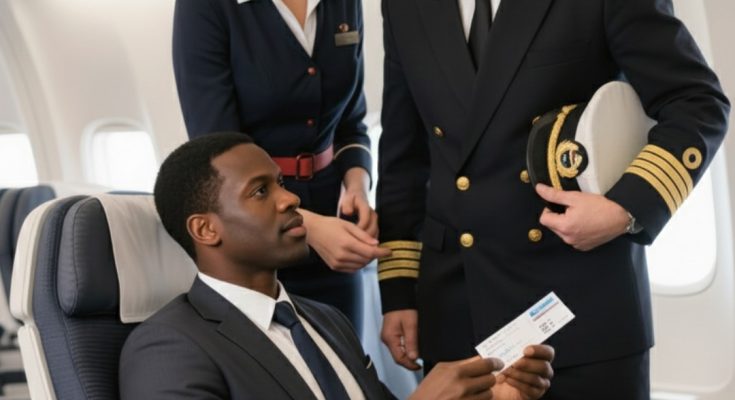Marcus Ellison adjusted his navy suit as he moved through the busy terminal at Los Angeles International Airport. At 42, he had earned a name as a sharp strategist—one of the few Black CEOs running a fast-rising Silicon Valley tech company. His day was tightly packed: after finishing an investor meeting in L.A., he was flying to New York to deliver the keynote at a major business summit.
At the gate, he handed his first-class ticket to the agent with a polite smile. She scanned it, nodded, and waved him on. Once aboard, Marcus found his seat—1A, first row. As he placed his carry-on overhead, a flight attendant approached with a stiff look.
“Sir, I think this seat may have been assigned in error. May I see your boarding pass?”

Marcus handed it over calmly. “First class, seat 1A,” he confirmed.
The attendant frowned, double-checked the ticket, and said, “I’m afraid there’s been a mistake. This seat is reserved. You’ll have to move to economy.”
Nearby passengers turned to look. Marcus stayed composed. “With all due respect, this is the seat I paid for. It’s printed right here on my boarding pass.”
Another crew member stepped in, more forceful this time. “Sir, please go to the back. We’ll sort this out after takeoff.”
Marcus knew exactly what this was. He’d seen it before—dis:cri:mi:na:tion dressed up as “errors” and “policy.” His chest tightened, but his tone stayed even. “I’ll stay in my assigned seat. If there’s an issue, call your supervisor or the captain. I’m not moving to economy when I paid for first class.”
Whispers spread through the cabin. Some passengers began recording. The crew exchanged uneasy glances, then reluctantly backed down, muttering it would “be handled later.”
Marcus sat quietly, staring out the window. His pulse raced, but outwardly he was calm. He knew every gesture would be judged. And as the plane ascended, he started planning his next move.
The six-hour flight passed without trouble, though the difference in service was obvious—warm smiles for others, cold courtesy for him. He worked steadily on his laptop, polishing his slides and rehearsing his speech.

When the plane landed at JFK and passengers began to disembark, Marcus waited his turn. At the door, the crew stood ready to offer polite farewells. That’s when Marcus paused, turned, and spoke clearly for all to hear:
“Captain, crew: today I was told I didn’t belong in my paid seat. I was ordered to economy despite holding a first-class boarding pass. This wasn’t just a mix-up—it was dis:cri:mi:na:tion. And I’ve recorded every moment.”
The terminal fell silent. A few passengers nodded—they’d seen it all. Marcus continued, voice steady but firm:
“I’m Marcus Ellison, CEO of Nexora Technologies. Tomorrow I’ll speak at the Global Innovation Summit before Fortune 500 leaders, officials, and the media. And I’ll share this story—not to humiliate anyone, but to show what professionals like me, people of color, still face even when we pay the same as everyone else.”
The captain shifted uneasily. “Sir, let’s not make this public…”
Marcus raised a hand. “I’m not escalating. I’m telling the truth. I don’t accept quiet apologies after public disrespect. If an airline wants my business—and the business of millions of others—it must treat us with equal dignity.”
Silence. Then soft applause. Murmurs of “good for him.” The crew froze, caught off guard by the calm confrontation. Marcus simply nodded, collected his bag, and walked away.
The next morning in Manhattan, Marcus opened his keynote with that story. He didn’t mention the airline. He didn’t name anyone. He spoke about what it means to rise as a Black executive and still be told he doesn’t belong in seat 1A.
“When you look at me,” he said, “you see a CEO, an innovator, someone leading hundreds of employees. But on that flight, I was treated as if I didn’t belong. Progress means nothing without respect and equality.”

The audience sat in silence. Reporters typed fast. Cameras flashed. Marcus tied the story to his company’s mission of building inclusive platforms for fairness and access. His keynote became more than a talk on innovation—it became a call for justice.
By afternoon, the story had spread online. Clips of his speech went viral. The airline released a statement promising a full investigation.
Later, an older executive approached him backstage. “I’ve flown first class countless times. Never once was I told I didn’t belong. Your story opened my eyes.”
That was the change Marcus wanted—not revenge, but awareness. A small break in a solid wall.
As he left the stage, he thought of the attendant who told him to move. He smiled faintly. They had underestimated him. They thought he’d stay quiet.
Instead, he turned exclusion into a message—and left the crew, the passengers, and the business world truly sh0cked.



